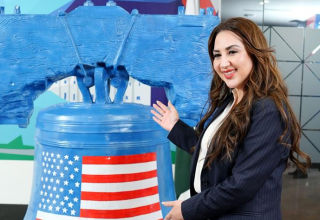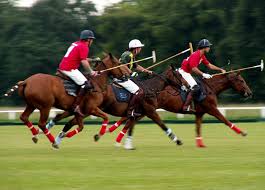
LOS ANGELES: Lacrosse, a sport invented in North America nearly 1,000 years ago, will make its return to the Olympics on native soil.
Inclusion in the Los Angeles 2028 Games after an 80-year Olympic absence brings tremendous opportunities and possibilities for the sport in the 21stcentury. “It’s a platform like no other,” said World Lacrosse CO Jim Scherr.
“More than 4 billion people will see some or all of the Olympic Games, and that exposure both as a brand and exposure for our sport internationally is just something that can’t get elsewhere. Not only that, the qualification cycle – whether it’s team selection, world championships or the Olympic qualification process – takes on significantly more important public visibility given the fact that it’s now the road to the Olympic Games.”
The road to LA28 began as early as the 12th century when a type of stickball was developed by Native Americans. That rich history and tradition is still reflected in the sport with the participation of the indigenous Haudenosaunee team.
First chronicled by French missionaries in the 1630s, lacrosse appeared in the Olympics in 1904 when the Games made their North American debut in St. Louis. Lacrosse was also played in London in 1908 and then became a demonstration sport in 1928, 1932 (also in Los Angeles) and 1948. With the formation of International Federations for women in 1972 and men in 1974, the journey back to the Olympics got off the ground.
“There was always an eye to returning to the Olympic platform,” Scherr said. The federations started discussing a merger in 2005. Three years later, they officially joined forces and shifted their Olympic aspirations into high gear. “Our rationale was if we were going to achieve what we wanted for our sport – increased growth, interest and a fanbase – the Olympics was the best way to do that,” said WL President Sue Redfern, who was vice president of the women’s International Federation from 2001 to 2008.
“We knew, even back in 2005, that we were looking at a likely 30-year road to achieving our lofty goal,” Redfern said.
For its Olympic campaign, lacrosse chose the high-scoring, fast-paced sixes format. That strategy was similar to the one adopted by World Rugby, which features its dynamic rugby sevens version at the Games. In 2009, the IOC voted rugby onto the Olympic program for 2016 and 2020. Subsequently, the sport was retained for Paris 2024 and Los Angeles 2028 due to its tremendous growth, fan engagement and outreach into new markets.
Three months before the Rio 2016 Games, World Rugby Chairman Bernard Lapasset called Olympic Games participation “a game-changer for rugby’s growth and popularity worldwide.” He said global participation had doubled in the seven years since the vote in 2009, with women’s participation increasing five-fold.
“Our unions have experienced significant National Olympic Committee investment and support, and rugby has been added to the school program in places where Olympic sports are taught,” he said.
According to World Rugby, the Rio Games brought an estimated 30 million new fans to the sport. Its second Olympic appearance – with no fans in attendance in Tokyo due to the pandemic – attracted 22 million video views and 3.4 million social media engagements. That was an increase of 77 percent from Rio 2016 with an emphasis on younger and more diverse fans.
World Lacrosse hopes for a similar boost. The sport has already enjoyed significant increases in participation, visibility and recognition over the last two decades with a corresponding rise in high-level competitions.
Membership stood at 45 nations at the end of 2008, and that number has now doubled to its current size of 90 National Federations across all five continental regions.
ESPN platforms carried all 107 games of the 2023 World Lacrosse Men’s Championship in San Diego to more than 185 territories around the globe. Olympic participation, Scherr said, “will serve as a huge impetus for growth.” He said sixes will be one of the primary tools to grow the sport at the grassroots level. The format is accessible and equitable, which drives interest in countries where lacrosse is getting a foothold.
“Creating opportunities for people to play lacrosse at a very young age will expand the game exponentially,” Scherr said. “Being able to have the stamp of approval of being an Olympic sport will unlock access to resources and unlock access to fields and programming opportunities in places we haven’t had before.”
Scherr added that opportunities for funding will come from supporters and sponsors and will augment the abilities of Ministries of Sport and National Olympic Committees to drive resources to their programming within their countries.
The combination of lacrosse’s modern, youthful relevancy with its unique origin makes the sport stand out. “The history of lacrosse is something that’s celebrated much more strongly throughout lacrosse than any sport that I’ve been involved with,” Scherr said.
“The people who originated the game still play it at the elite level, so there’s a real, strong connection in the whole lacrosse community with the origins of the game. And I think just being in the Olympics will give another great opportunity to continue to embrace the history and rich traditions of the sport.”
He said the journey to Olympic inclusion has been gratifying for all involved. “I think what made the difference for lacrosse is the fact that the entire lacrosse community was united behind this effort from professional leagues all the way down to our member countries and then athletes, coaches and officials. I think that combined approach and desire was a distinguishing factor.”
Scherr also credited the strength of the game, its qualities and values, and that is ultimately an “incredibly entertaining game to consume.” While that obviously resonated with the sport’s new partners – LA28 and the IOC – Scherr said those organizations also had “a high degree of trust in the capability of the International Federation to manage our sport and to put a good property on the field of play at the Olympic Games.”
Lacrosse hopes to remain on the program for Brisbane 2032 and future Games.
“We have to do all the things we’re doing now,” Scherr said, “growing our sport, building the brand and following of our game for television and digital media, and continuing to develop our sixes discipline.” And thanks to its new stature as an Olympic sport, lacrosse can offer its athletes the ultimate experience on the world’s biggest stage.
“It’s incredible,” Scherr said, “because it now gives the opportunity for players in the game to be able to have that dream of competing in an Olympic Games, marching in an Opening Ceremony and possibly standing on an Olympic podium.” –World Lacrosse








